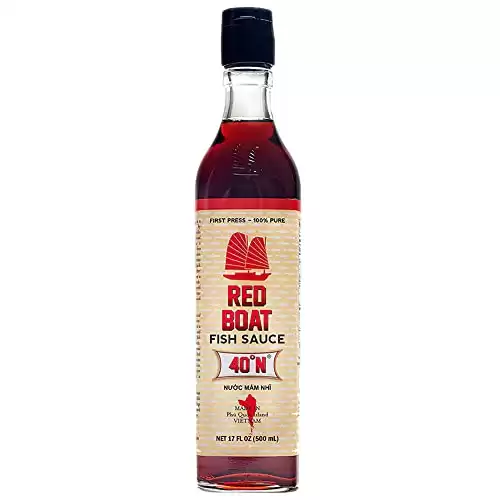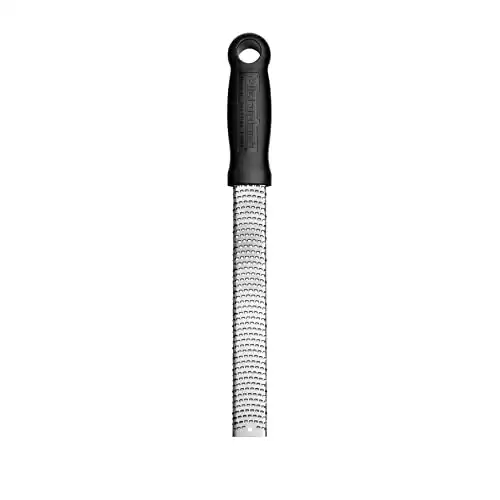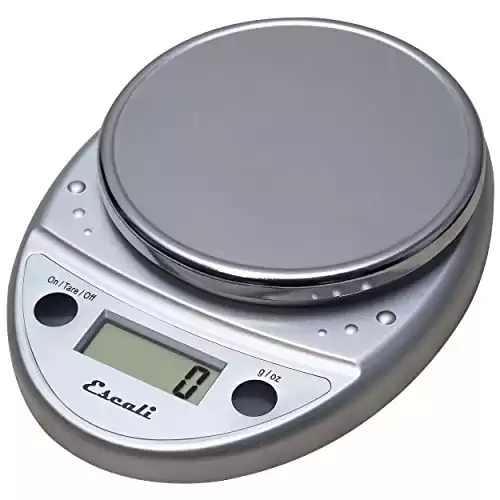When I think “easy pasta dish,” an easy lemon garlic pasta recipe is one of my go-to’s.
I love my “comforting noodles,” but this recipe is arguably even easier to make. Known as pasta al limone in fancier circles, garlicky lemon pasta is a classic for a reason.
I’ll show you how to vary the recipe to suit your tastes, offer some variations to make it a main course, and explain my use of a “secret ingredient” that makes this easy pasta recipe so more-ish.
You may also like my easy creamy pasta sauce recipe.
For ease of browsing, you can find all my pasta recipes in one place. Thanks so much for being here. Let’s get cooking!
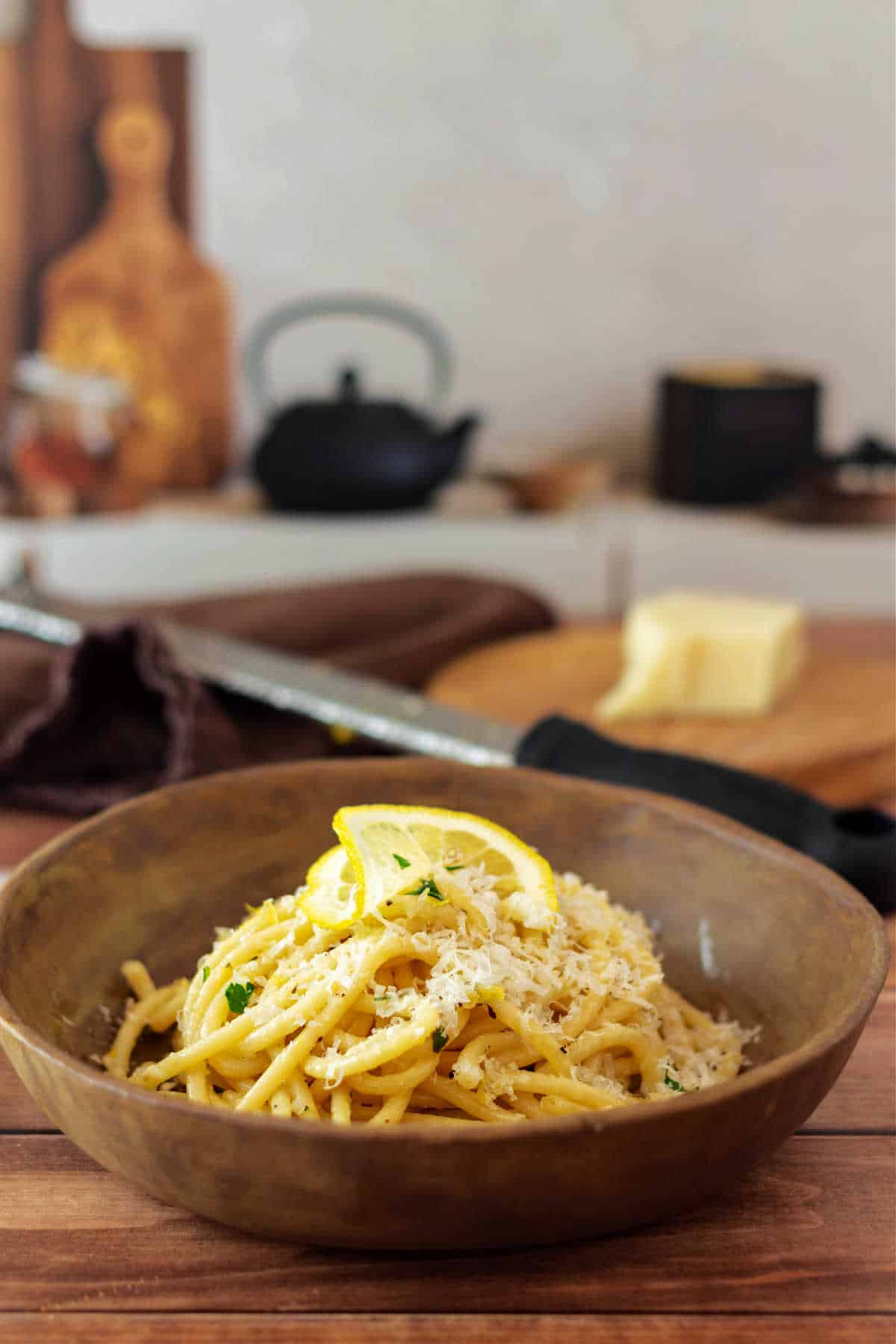
Watch my easy lemon garlic pasta recipe web story here.
How I Developed This Recipe
Pasta is kind of my downfall. I find it hard to resist, so when a reader asked for a lemon pasta recipe, I knew it would test my willpower.
Friends, I have lost to this pasta recipe. Because it is really that good!
I knew I didn’t want to have cream in it, or ricotta or other creamy, cheesy type element, because too much dairy can mute lemon flavor.
A little dairy, though? Yes. Just enough to add a creaminess to a quick, emulsified sauce made right in the pan along with the pasta.
What we’re doing is basically making a lemon vinaigrette that happens to have bucatini (or your favorite long pasta shape) in it.
So, what is needed is fat, acid, and flavorings.
For the fat, I used olive oil and butter. The acid, obviously, is lemon juice. And the flavorings are lemon, garlic, salt and pepper, and chopped, fresh herbs.
How Do You Emulsify a Pan Sauce?
The secret to emulsifying a lot of fat and lemon juice into a pan sauce is an emulsifier.
When making a vinaigrette, a little egg yolk or mustard acts as the magical ingredient that allows you to whisk the two into a thick sauce.
In this lemony pasta sauce, the secret is the starch from the pasta water.
Adding some of the pasta cooking water provides enough starch to let you use your tongs to toss the pasta and agitate the sauce into creamy goodness that coats the strands of pasta.
It also doesn’t hurt to add some cold butter at the end of cooking, which is already an emulsification of butterfat and water.
The Secret Ingredient, or Why This Pasta is So Delicious
Then there was another issue. When lemon is such a “top note,” how do you ground it? Or do you just let it be light and bright, balancing it with a different dish entirely?
I chose to balance the dish so that, in and of itself, the lemon would sing, but would also have a deeper flavor than just the garlic alone could manage.
I looked at a lot of pasta al limone/lemon pasta/lemon garlic pasta recipes, and none seemed to contain a “bass note” that would balance the brightness of the lemon.
And then a reader mentioned anchovies.
Of course, anchovies lend umami goodness to almost anything you put them in without tasting fishy. They just make everything taste better.
I don’t keep anchovy in the house, but I always have a good supply of high-quality fish sauce, which is made from fermented anchovies.
And that is the secret ingredient that makes this bright lemony pasta dish which can be a bit two-dimensional into a lip-smacking pasta dish you’ll want to find reasons to eat for all the meals!
Adding just a little fish sauce to almost anything brings delightful umami flavor to the party. Trust me, I am not a fan of strong fish just to munch on, but fish sauce is another thing entirely. Add it to ground beef, chicken soup, stock, rice, vegetables. Even lemon garlic pasta! Really, anywhere you need a little extra lip-smacking goodness, you'll want to add a couple of shakes of Red Boat!
How to Make It
Here’s what you’ll need to make this recipe. If you don’t need a lot of this background information, feel free to jump straight to the recipe.
Ingredients and Substitutions
Here’s what you’ll need, friends. I’ll let you know of substitutions below the photo.
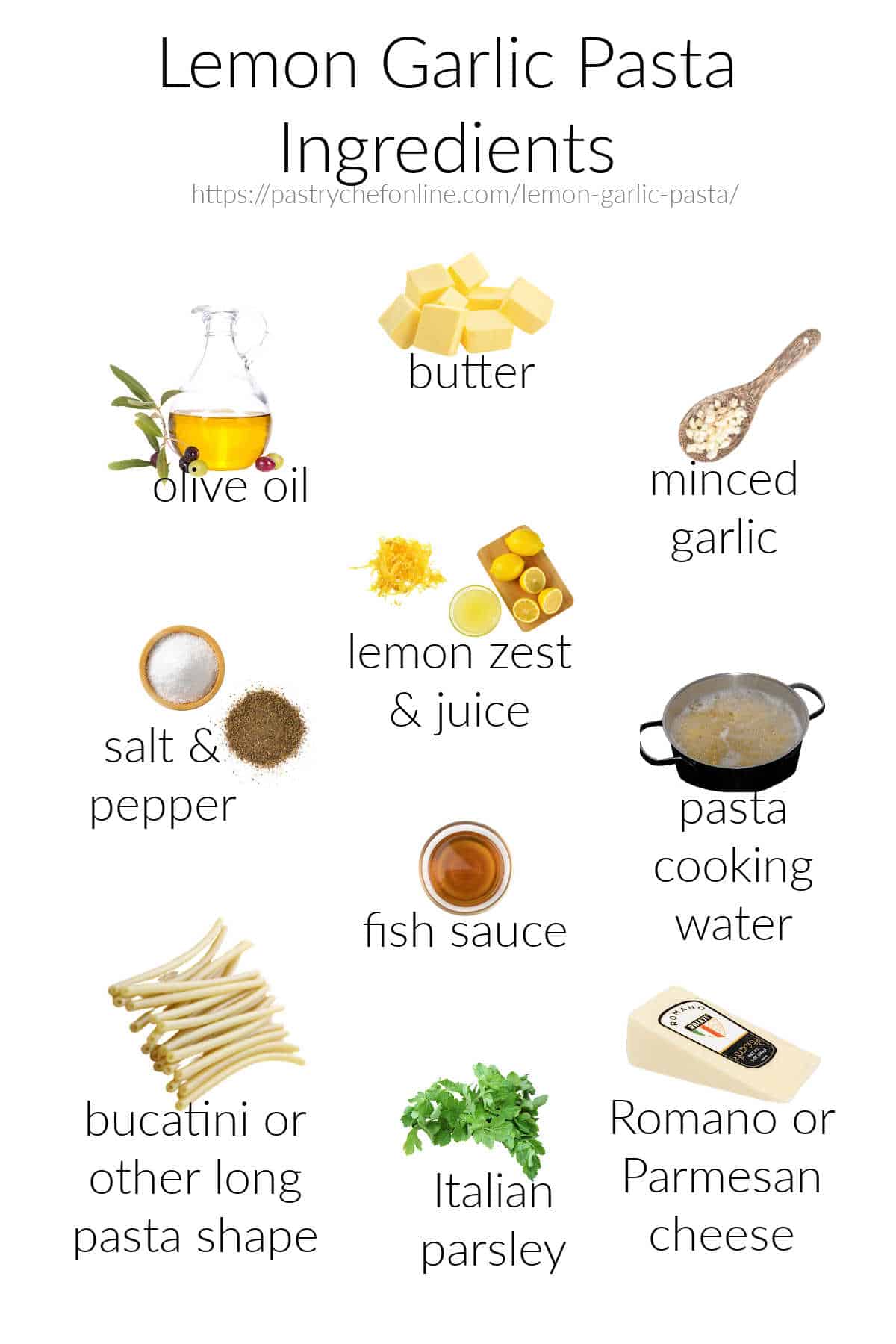
- olive oil: provides flavor and a good portion of the fat that carries the other flavors. Use the good stuff here since you won’t be heating it really hot. We’re not frying!
- butter: Adds additional fat and some milk solids for creaminess. If you want, you can start with browned butter if you have some on hand. Or use ghee. It won’t have the milk solids in it, but it will still have a lovely, rich, buttery flavor
- minced garlic: You can choose how much garlic you want to use. If you just want a hint of garlic, use 1-2 cloves, and if you want a punch of garlic, go with 4-5 cloves. You can also leave it out altogether or consider substituting minced shallot instead.
- salt: Brings out the flavor in the butter and garlic–salt snaps all the flavors into focus
- pepper: Adds a bit of bite. If you like more bite, add a pinch or three of chile flakes instead of or in addition to black pepper
- lemon zest: Provides sweet, floral notes of lemon
- lemon juice: Adds the sour punch to round out the lemon flavor profile of this dish
- fish sauce: This is the secret ingredient right here, friends. You won’t taste it, per se, but you’ll get that lip-smacking, “Oh, I need just one more bite” thing that umami brings to everything. You can also substitute one anchovy filet completely mashed, a little of the liquid from canned tuna, or bonito flakes, or if you want to keep the dish vegetarian, substitute some coconut aminos or maybe a splash of soy sauce. Some shredded nori would work too as well as a little bit of miso paste or some powdered shiitake mushrooms
- pasta cooking water: The starch in the pasta water is what helps bind and thicken the sauce into a silky-smooth coating for your pasta. Use “bronze die cut” pasta–it will say it on the package–because it will give off a lot more starch than regular, supermarket pasta. And more starch equals a silkier sauce
- bucatini: Bucatini is like long, thick spaghetti that has a small hole running through it. They’re like edible straws, and I love the chewy, “boingy” texture of these thick, fun noodles. You can also use spaghetti, linguine, or fettuccine if you prefer
- Italian parsley: Adds a fresh, herbal layer to the dish. Use any fresh, tender herbs you like. Basil would be lovely as would tarragon or dill. Fennel fronds would make for the perfect springtime pasta dish. Thyme leaves or lemon balm will work as well. Use one or a mixture and make this lemon pasta dish your own
- Romano cheese: I like the saltiness of Pecorino Romano, but any hard, grating cheese will work here. Parmesan or Asiago are good substitutes for the Romano
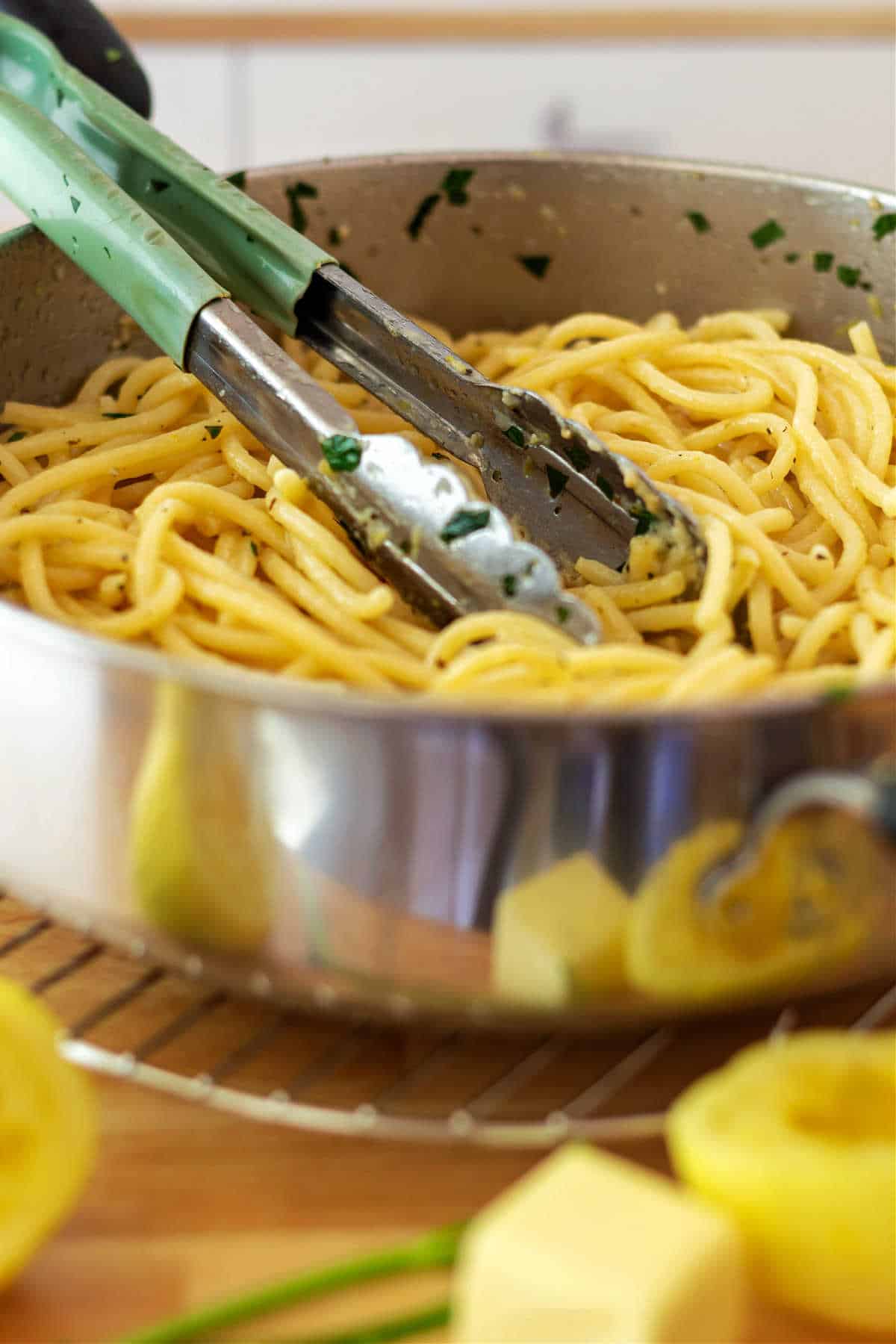
Procedure
This pasta dish comes together easily.
You’ll make it in three steps.
- Cook the pasta
- While the pasta is cooking melt the butter into the oil, add salt, pepper, lemon zest, and garlic. Let the flavors mingle over medium-low heat. You just want to perfume the oil and not brown the garlic
- Marry the pasta to the sauce with lemon juice, fish sauce, pasta water, and cold butter
Once the sauce is silky and coats the pasta, you can either add the cheese in the pan and toss to coat or portion your pasta and add cheese to each plate.
Jenni Says: When heating the oil, butter, and other flavorings, moderate the heat on the stove so you get some gentle sizzling, but you don’t want the garlic to brown and become bitter.
A Closer Look
I made a couple of collages for you to see how to put this dish together.
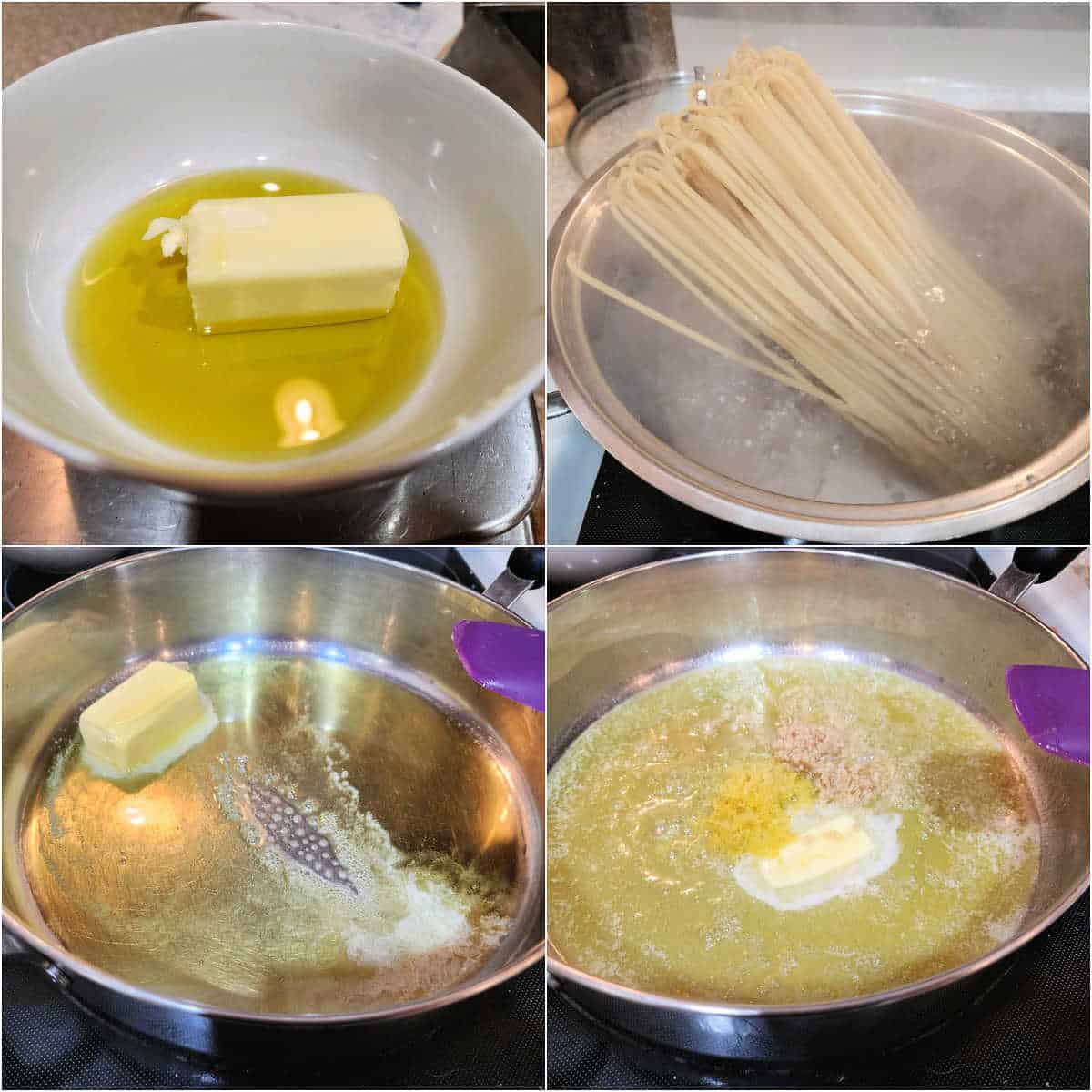
- You’ll use equal parts, by weight, of butter and oil to begin the sauce.
- Bring your water to a boil and cook your pasta until it’s al dente. Note that super-long bucatini, y’all. It was fantastic. I bought the Pastai Gragnanesi brand through Amazon. Highly recommend.
- While the pasta cooks, melt the butter and oil together in a saute pan.
- Add the lemon zest, garlic, salt, and pepper and let it gently sizzle on medium-low to low heat so the garlic and lemon perfume the oil. Keep the heat low, because you don’t want the garlic to burn.
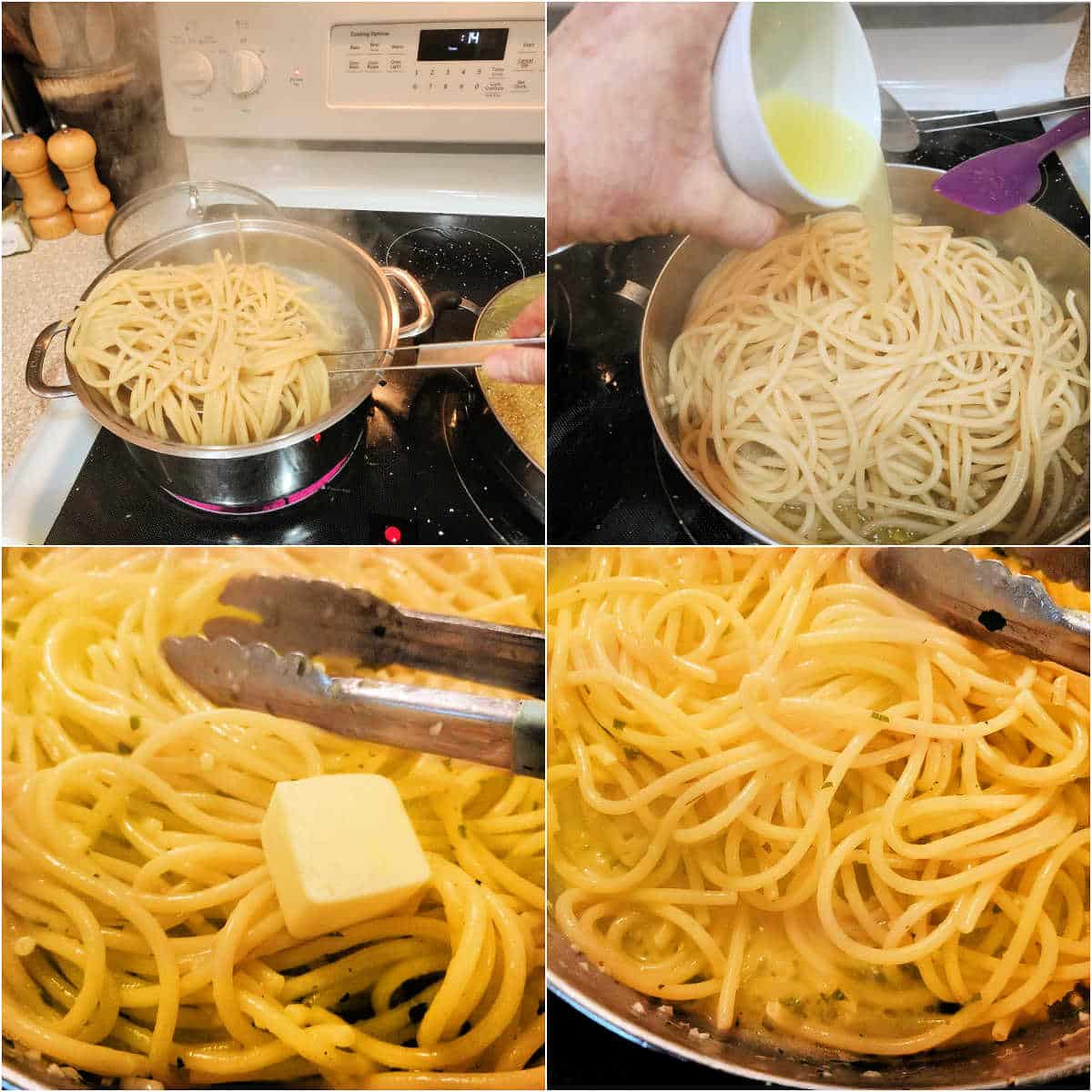
- Once the pasta is cooked to al dente, rather than lift a heavy pot, just pull out the cooked pasta using tongs or a large spider and put it in the pan with the butter, oil, lemon, and garlic
- Pour in the lemon juice and fish sauce (or your substitute). Some water will cling to the pasta as you move it, but you’ll need to add another 2-4 ounces in addition to the lemon juice and fish sauce.
- Add an ounce of butter, turn the heat up to high, and toss the pasta and sauce together until the pasta is coated with sauce and the sauce is thick.
- You can see how creamy the sauce is in that last image.
Toss in the herbs at the very end and then either add the cheese or plate the pasta and then add the cheese to individual plates.
A little finishing sauce and perhaps additional lemon zest makes a nice finishing touch.
Jenni Says: Always marry pasta and sauce together over high heat. There is nothing sadder than naked pasta with sauce poured over it. Don’t worry about the garlic burning at this point. There’s enough liquid in the pan to prevent that.
Variations
The simplest variations to this recipe are to your preferred cooked protein to it.
Saute some shrimp in oil with a little lemon and toss those in. Or maybe add some clams steamed in white wine and stock.
Adding canned, flaked tuna is a great plan as well. When adding oily fish, you can leave out the fish sauce since you’ll have plenty of umami from the tuna.
You can also add other vegetables if you’d like.
But do remember, at its heart, pasta al limone (lemon garlic pasta) is about celebrating lemony goodness, so keep it simple and let the lemon and garlic flavors shine.
Equipment You May Need
I cook my pasta in a large Dutch oven, but use your preferred pan for cooking pasta.
I also have fairly recently stopped draining my pasta unless it’s for a pasta salad.
Rather, I move the pasta from its cooking water to my pan of sauce using either tongs or a spider/skimmer, depending on the shape of the pasta.
Tongs work better with longer shapes, and a large spider works really well for short shapes.
Jenni Says: Transferring cooked pasta using tongs or a spider means you don’t have to pick up a heavy vat of boiling water and pasta. I find it much safer and easier than dumping a huge pot of pasta into a colander.
And for showering fine shreds of cheese over food, a Microplane is my tool of choice. Nothing does it better.
What started out as a woodworking tool has come into its own in the kitchen. I have two Microplanes, and I love them.
If you've never used one before, here's what you can do with them:
- zest citrus fruit like a dream
- grate hard spices like nutmeg and cinnamon
- mince garlic and ginger into a fine paste
- shower hard grating cheese over your pasta or pizza
- grate cocoa butter into your smoothies
- make baby-fine shavings of chocolate
- and more
Tips and Tricks for Success
Adding some cold, whole butter along with the other liquids at the end of cooking encourages emulsification and lends to a thickened and silky sauce
Using a bronze die-extruded pasta ensures plenty of starch in the water for emulsifying your sauce as well as a slightly rough noodle surface for the sauce to cling to.
Cooking the pasta in a smaller amount of water rather than filling the pot to the top will yield water with more starch in it, and that helps build a more stable sauce.
Serving Suggestions
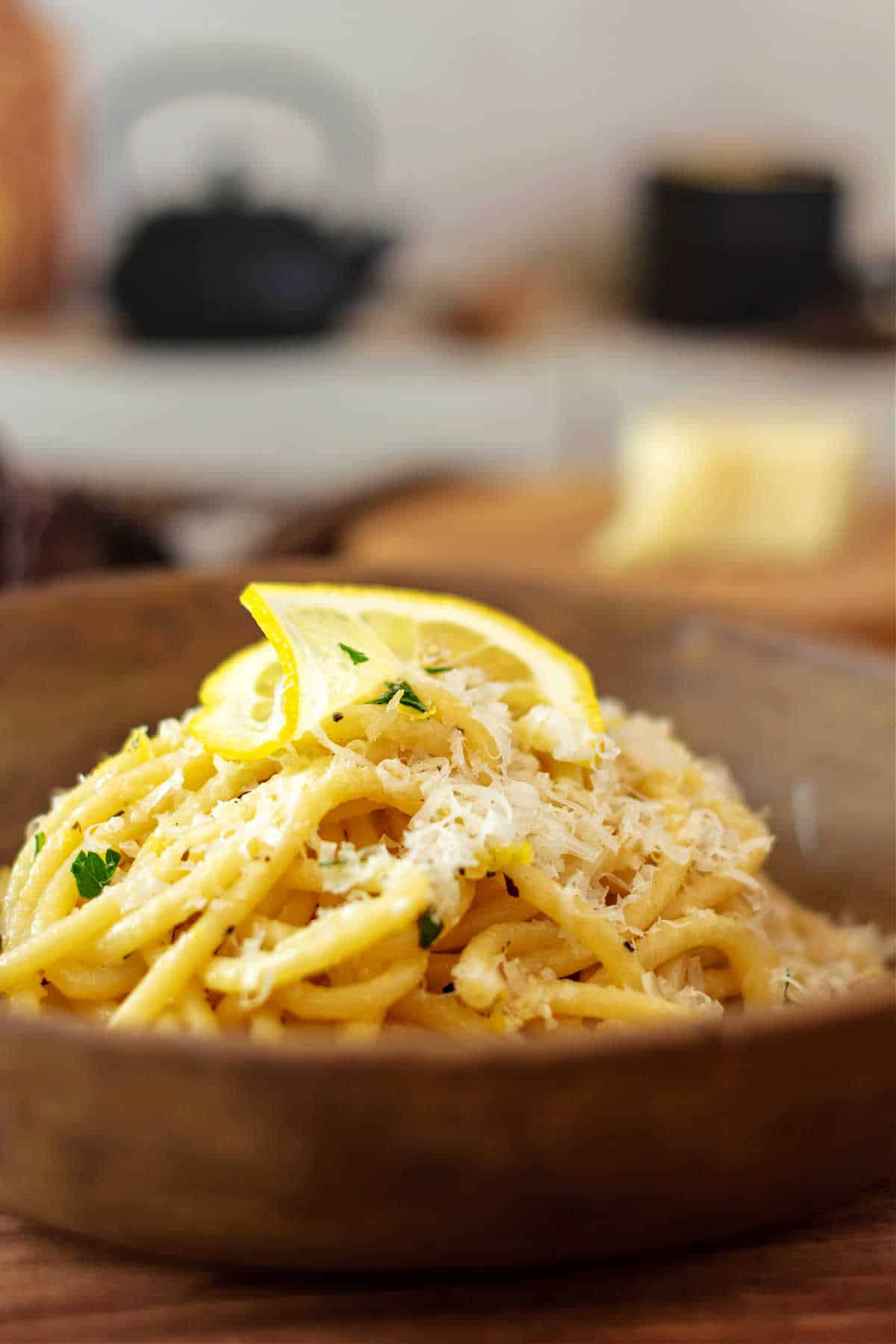
This lemon pasta shines because of its simplicity, so keep your accompaniments simple as well.
A side salad and some crusty bread or focaccia are really all you need.
Since this is an Italian meal, an Italian dessert of coffee panna cotta or some egg-free tiramisu would make a lovely and thematic dessert.
Or keep on with the lemon theme and serve lemon ice cream or sunny lemon bars for dessert.
Lemon Garlic Pasta Q & A
You can, although the sauce won’t stay emulsified. This is not a huge issue for me, because I love leftover pasta in whatever way I can get it. Just know the sauce will mostly have soaked into the pasta and that some of your butter will be solidified in the bottom of your storage container. Just scrape it out and heat with the pasta, tossing to coat evenly. You can reheat on the stovetop or in the microwave in 30-second increments, tossing the pasta in between bursts.
While your leftovers will keep for about a week, for best flavor and texture, reheat and finish up within 3 days.
You can easily cut the recipe in half with no issues. It may be more difficult to get a good emulsion with a larger batch, though.
Other Pasta Recipes
For a comforting and decidedly American pasta casserole, try my mom’s hamburger macaroni casserole supreme.
It really is supremely comforting and open to almost endless interpretation.
For more bucatini action, try my spaghetti pie, which I made with bucatini because bucatini > spaghetti. Always! It’s a fun and deliciously cheesy, eggy pie with spicy soppressata that makes a perfect brunch or light supper option.
And if it happens to be winter and you want a really rich pasta dish to warm you from the inside out, try my Italian sausage lasagna. So good, friends.
Questions?
If you have any questions about this or any other recipe or post on the site, there are a few ways to get in touch.
You can leave a comment on the post, and I’ll be back in touch within 24 hours.
If your question is more pressing, don’t hesitate to email me, and I should be back in touch within 4 hours (unless I’m asleep) or often much more quickly than that.
A Note About Measurements
This is the kitchen scale that I recommend for home cooks and bakers. Using a scale will help you be more accurate and consistent in your measurements.
It is lightweight, easy to store, accurate, and very easy to use.
Don't let its small price and small size fool you. The Escali Primo is an accurate and easy-to-use food scale that I have used for years. It's easy to store, easy to use, has a tare function, and easily switches between grams and ounces/pounds for accurate measurements.
Love This? Please Share It and Review It!
I hope you’ve learned something from this post or that you’ve decided to make the recipe.
It would really help me and other readers out if you’d rate the recipe using the star ratings in the recipe card.

It’s also very helpful to me and to other readers if you leave a comment and/or a recipe review.
Thank you so much for being here and for helping others find my recipes by sharing on your social platforms!
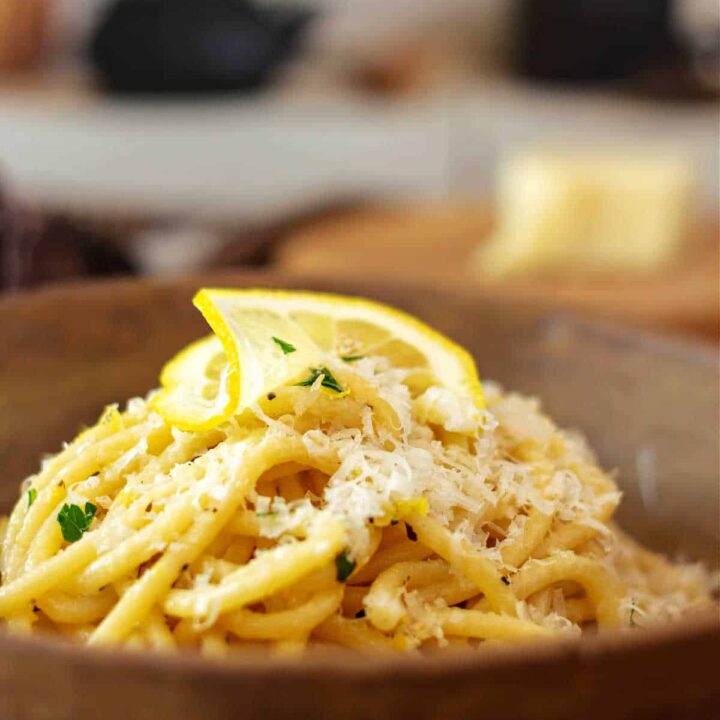
Easy Lemon Garlic Pasta
Bright lemon flavor mingles with oil, butter, and garlic in an easy pan sauce coating your favorite long pasta. This lemon garlic pasta also has a hint of umami that really makes it hard to stop eating.
Ingredients
- 57 grams (2 oz or about 1/4 cup) extra virgin olive oil
- 85 grams (3 oz or 6 Tablespoons) unsalted butter, divided
- zest of 1 large lemon
- 3-5 garlic cloves, minced
- 1/2 teaspoon kosher salt, or to taste
- several grindings of black pepper, to taste
- 1 pound bucatini or your favorite long pasta shape, cooked according to package directions, to al dente
- 85 grams (3 oz or a scant 1/3 cup) freshly squeezed straiined lemon juice
- 85 grams (3 oz or a scant 1/3 cup) starchy pasta water
- 2 teaspoons fish sauce
- large handful of tender herbs such as Italian parsley, basil, dill, tarragon, or a mixture, finely chopped
- 57 grams (2 oz or about 2/3 cup) Pecorino Romano or Parmesan cheese, or a mixture
Instructions
- Fill a large pasta pot about 2/3 with water. Bring to a boil over high heat.
- While the water is coming to a boil, measure out all your sauce ingredients and zest and juice the lemons.
- When the water comes to a boil, salt it generously and add the pasta. Depending on the shape you're using, it could take anywhere from 7-11 minutes to reach al dente, so check the package directions or test a piece every once in a while.
- Once the pasta is boiling, in a large saute pan, melt 57 grams (2 ounces or 4 Tablespoons) of the butter into the oil over medium heat.
- Reduce the heat to medium-low and add salt, pepper, lemon zest, and minced garlic. Let this sizzle gently while the pasta finishes cooking. Monitor the heat so the garlic doesn't burn. You may need to turn the heat down to low.
- When the pasta is ready, use tongs to transfer it from the cooking water into the pan with the oil and butter mixture.
- Once all the pasta is in, pour in the lemon juice and fish sauce.
- Add the pasta cooking water and the remaining butter.
- Turn the heat to high and use tongs to toss the pasta together in the sauce until the sauce has thickened and is silky and coats the pasta strands.
- Add the chopped herbs during the last few seconds and toss to combine.
- Add the cheese and toss or wait until you plate the pasta, grating a generous amount of cheese over each serving.
- If desired, garnish with a little more chopped herbs, lemon zest, and finishing salt.
Notes
This recipe is easily halved. If you try to double it, it may be harder to emulsify the sauce, so proceed with caution.
Storing
Store leftovers, well covered, in the fridge for up to a week, but leftovers will be tastiest within about 3 days.
Nutrition Information
Yield 4 Serving Size 1Amount Per Serving Calories 640Total Fat 39gSaturated Fat 16gTrans Fat 0gUnsaturated Fat 21gCholesterol 66mgSodium 712mgCarbohydrates 58gFiber 4gSugar 3gProtein 17g
The stated nutritional information is provided as a courtesy. It is calculated through third party software and is intended as a guideline only.

Hi, everyone!
If you haven’t already, I’d love to have you sign up for my newsletter.
I generally send one or two a week with recipes, tips, and some behind-the-scenes action.
Just click the button below to sign up. Thank you!
Thanks so much for spending some time with me today.
I hope you enjoy the XYZ.
Take care, and have a lovely day.
The post Easy Lemon Garlic Pasta Recipe appeared first on Pastry Chef Online.

